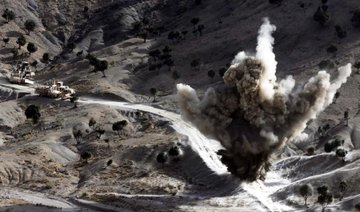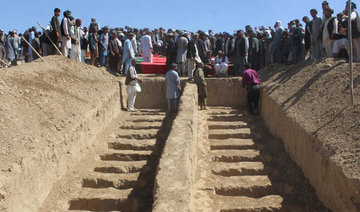KABUL, Afghanistan: A US commander on Wednesday apologized for leaflets dropped in Afghanistan that were deemed offensive to Islam.
The leaflets dropped Monday night, which encouraged Afghans to cooperate with security forces, included an image of a dog carrying the Taliban flag, said Shah Wali Shahid, the deputy governor of Parwan province, north of Kabul. The flag has Islamic verses inscribed on it, and dogs are seen as unclean in much of the Muslim world.
“Local people are very upset with this incident, and they want the perpetrators brought to justice,” Shahid said, adding that demonstrations were expected across the province.
Maj. Gen. James Linder apologized, acknowledging in a statement that “the design of the leaflets mistakenly contained an image highly offensive to both Muslims and the religion of Islam.” He offered his “sincerest apologies for this error.”
Throughout the 16-year Afghan war, US forces have struggled to convince ordinary Afghans to help them defeat the Taliban. Afghanistan is a deeply conservative country, and alleged blasphemy has sparked riots.
Elsewhere in Afghanistan, two civilians were killed by a roadside bomb in the eastern Laghman province on Wednesday, according to Sarhadi Zwak, the spokesman for the provincial governor. No one claimed responsibility for the attack, but Taliban insurgents are active in the province.
US apologizes for Afghanistan leaflets that offended Muslims
US apologizes for Afghanistan leaflets that offended Muslims

Israeli fire wounds five in south Lebanon as residents try to return, Lebanese media reports

- Israel said on Friday it intended to keep troops on the ground beyond the Sunday deadline
- Kfar Kila is one of dozens of border villages where residents are forbidden from returning
Israel said on Friday it intended to keep troops on the ground beyond the Sunday deadline stipulated in the US-brokered ceasefire that halted last year’s war with the Iran-backed Hezbollah. Israel did not say how long its forces would remain.
The deal stipulated that Israeli forces should withdraw from south Lebanon as Hezbollah’s weapons and fighters were removed from the area and the Lebanese army deployed, within in a 60-day period which ended on Sunday morning.
Israel has said the terms had not been fully enforced by the Lebanese state, while Lebanon’s US-backed military on Saturday accused Israel of procrastinating in its withdrawal.
Lebanon’s National News Agency reported that Israeli forces opened fire on residents of the village of Kfar Kila after they crossed a barricade put up by Israeli forces, wounding five.
The Israeli military said it was looking into the report.
Kfar Kila is one of dozens of border villages that the Israeli military has said residents are forbidden from returning to until further notice.
Pakistan Association Dubai hosts climate action event to promote sustainable solutions

- Pakistan is counted among world’s Pakistan is counted among world’s most severely threatened countries due to climate change effects most severely threatened countries due to climate change effects
- Event brings together climate activists, advocates and youth leaders to discuss climate challenges
ISLAMABAD: The Pakistan Association Dubai (PAD) this week organized a climate action event in the city to promote sustainable solutions and highlight the dangers of deteriorating weather patterns, the Pakistani embassy in the UAE said.
The event on Friday was a collaboration between community climate action platform Extreme Hangout Dubai, social enterprise Earth Warriors and the Pakistan Youth Forum.
It featured climate advocates and members of the Pakistani community in the UAE, and Pakistan’s Consul General in Dubai Hussain Muhammad.
“Pakistan remains committed to be part of the solution,” Muhammad was quoted as saying by the Pakistani embassy in UAE. “However, global solidarity, climate finance, and technology transfer are essential to tackling this crisis.”
The event featured entrepreneurial stalls showcasing innovative eco-friendly solutions, keynote speeches and panel discussions by experts, activists and youth leaders who engaged in insightful discussions on climate action strategies and the importance of collective efforts.
The event also included performances and artistic presentations highlighting the beauty of nature and the necessity of preserving it for future generations.
“The Consul General encouraged the Pakistani community in the UAE to act as global ambassadors for Pakistan’s climate challenges through storytelling, social media and community engagement to raise awareness and bring change,” the embassy’s statement said.
The South Asian country is counted among the most severely threatened countries in terms of climate–induced challenges, especially in the context of its dependency on climate-sensitive sectors such as agriculture, water, natural resources and the environment, and socio-economic issues such as poverty.
Unusually heavy monsoon rains and melting of glaciers in June 2022 triggered flash floods across the country which killed over 1,700 people and dealt damages to critical infrastructure across the country.
Pakistan estimates damages from the floods to be around $33 billion.
Over 3,000 Pakistani, overseas athletes expected to take part in Islamabad Marathon today

- Marathon to feature five categories: full marathon, half marathon, children’s race, family race and senior race
- A prize money of Rs1 million [$3594] has been allocated for winners of all categories, says marathon organizer
ISLAMABAD: Over 3,000 athletes from Pakistan and abroad are expected to take part in a running marathon in Pakistan’s capital today, Sunday, state-run media reported.
Organized by the Islamabad Run With Us (IRU) running community in the capital, the marathon will feature five categories: a full marathon, a half marathon, a children’s race, a family race and a senior race.
The IRU says it has organized over 700 complimentary community events and numerous races, adding that it launched the Islamabad Marathon event in 2020.
“Founder of the Islamabad Run with Us community, Qasim Naz announced on Friday that the fifth Islamabad Marathon will take place on January 26, with the participation of over 3,000 athletes from across Pakistan and abroad,” state-run Associated Press of Pakistan (APP) said.
Naz said a prize money of Rs1 million [$3594] has been allocated for winners of all categories of the marathon.
The marathon kicked off at the city’s newly built Iran Avenue at 9:00 am. Its route includes the GT Road and runners will have to return to the starting point, the organizer said.
Naz said a pitch system would be introduced to ensure transparency, enabling real-time tracking of athletes and accurate identification of winners.
“He said that the purpose of organizing the event is to showcase Pakistan’s soft image and highlight the country’s beauty to the world,” APP said.
Naz said arrangements for medical and other facilities for participants have been made with cooperation from the district administration and police.
Pakistan says won’t risk rushing Saim Ayub’s recovery for Champions Trophy

- Saim Ayub was ruled out of competitive cricket for six weeks after suffering ankle injury this month
- Left-handed batter will enter recovery phase in a day or two, says PCB Chairman Mohsin Naqvi
ISLAMABAD: Pakistan Cricket Board (PCB) Chairman Mohsin Naqvi said on Sunday that he will not risk injured batter Saim Ayub’s future by rushing his recovery for the sake of the multi-nation Champions Trophy tournament, which is scheduled to get underway in Pakistan and Dubai next month.
Ayub, one of Pakistan’s most in-form batters who helped the team secure a historic ODI series whitewash over South Africa in December, suffered a right ankle fracture while fielding in the second Test against South Africa this month.
The injury forced Ayub out of competitive cricket for six weeks, dealing Pakistan a massive blow before it hosts the multi-nation Champions Trophy tournament in February. Ayub is currently in London seeking treatment as Pakistan hopes the star batter recovers in time for the crucial tournament.
“I am in contact with Saim on almost a daily basis. His rehab is going on and god willing, the plaster on his foot will be removed in a day or two after which he will enter the recovery phase,” Naqvi told reporters.
“It will take time, I don’t want to put his future at risk because of one Champions Trophy.”
The PCB chairman said he was monitoring Ayub’s rehabilitation himself, adding that Ayub was Pakistan’s asset and would soon make a full recovery.
Pakistan will play the Champions Trophy tournament opener on Feb. 19 against New Zealand in the eastern city of Lahore.
Pakistan expresses desire to formulate joint plan to combat ‘terrorism’ with US

- Interior Minister Mohsin Naqvi met US lawmakers, investors in Washington this week to discuss bilateral issues
- Pakistan has faced a surge in militant attacks in its western provinces bordering Afghanistan since November 2022
ISLAMABAD: Pakistan’s Interior Minister Mohsin Naqvi said on Sunday that Islamabad wanted to formulate a comprehensive plan with American politicians to combat “terrorism,” amid Islamabad struggle to contain surging militant attacks on its soil in recent months.
Islamabad and Washington have shared a complicated history when it comes to bilateral ties. Both countries shared close defense and security cooperation in the past, particularly during the Cold War after the 1979 Soviet invasion of Afghanistan and post-September 11, 2001 attacks.
However, more recently, US officials criticized Pakistan for not sufficiently supporting their military efforts against the Taliban following the 9/11 attacks. Islamabad denies sheltering Taliban fighters and helping them regain control of Afghanistan in August 2021.
Pakistan has faced a surge in militant attacks in its western provinces bordering Afghanistan since November 2022, ever since its truce with the Pakistani Taliban broke down. Islamabad blames Afghan rulers for providing sanctuaries to militants to launch attacks against Pakistan, charges the Taliban government vehemently denies.
“See the main purpose of my visit this time [to the US] was to make a comprehensive plan against terrorism with the politicians here,” Naqvi told reporters in Washington.
Naqvi is in Washington where he met US lawmakers this week to hold talks on issues of bilateral concern between the two countries.
“The terrorism that we are suffering is not just our fight, it is everyone’s fight,” he added. “Both 2023 and 2024 were bad years for us but you will see that whosoever takes up arms against Pakistan will suffer a bad fate.”
On Saturday, the Pakistani interior minister visited the United States Chamber of Commerce in Washington where he spoke to a delegation of the US-Pakistan Business Council.
Naqvi invited American investors to invest in Pakistan’s priority sectors, particularly in IT and minerals, state broadcaster Radio Pakistan said.
“Talking to a delegation of the US-Pakistan Business Council during his visit to United States Chamber of Commerce in Washington, he highlighted Pakistan’s mining and IT sectors have emerged as investors’ ultimate destination,” it added.
Citing Pakistan’s recent economic gains, Naqvi said the country is heading toward economic stability “rapidly,” adding that all economic indicators have improved.












